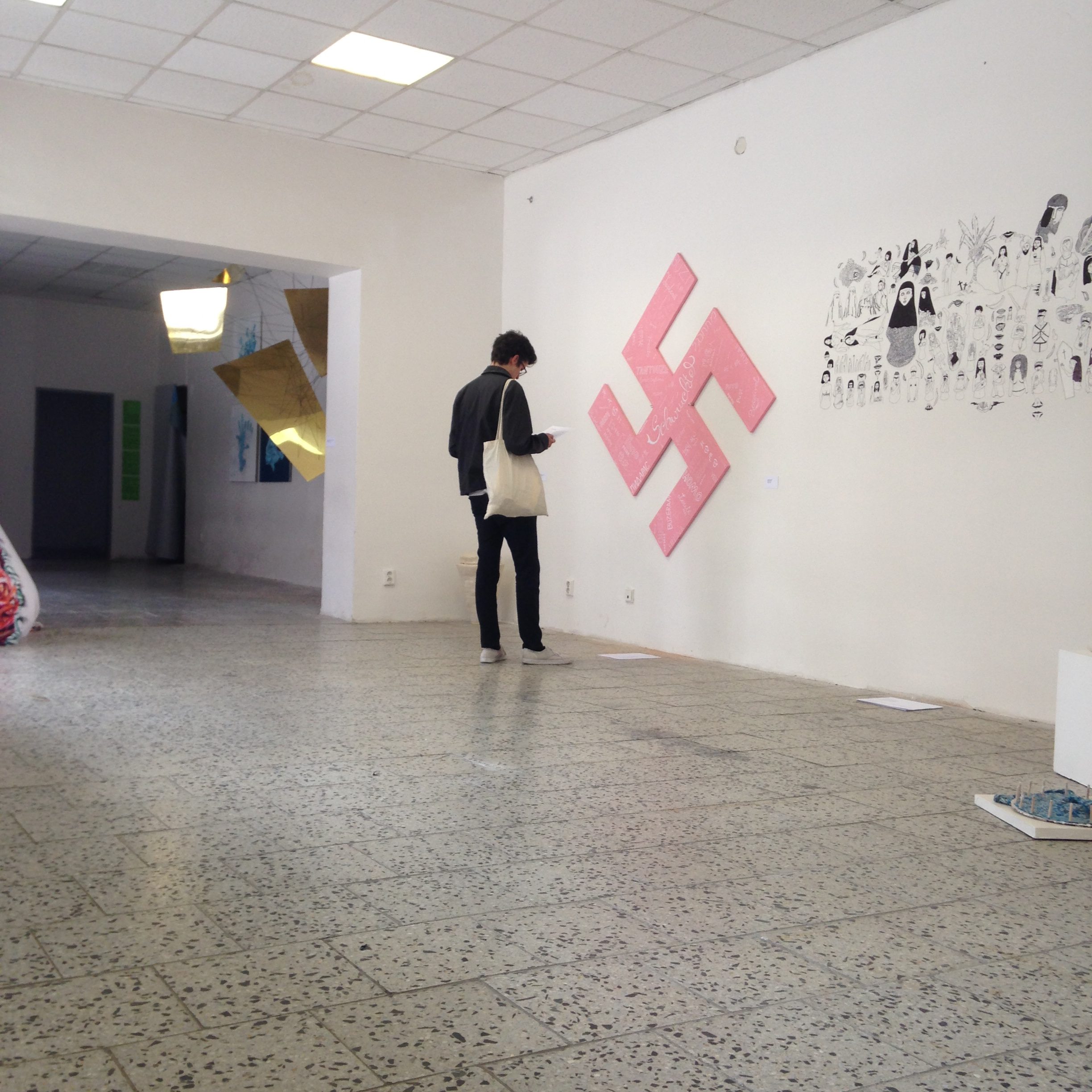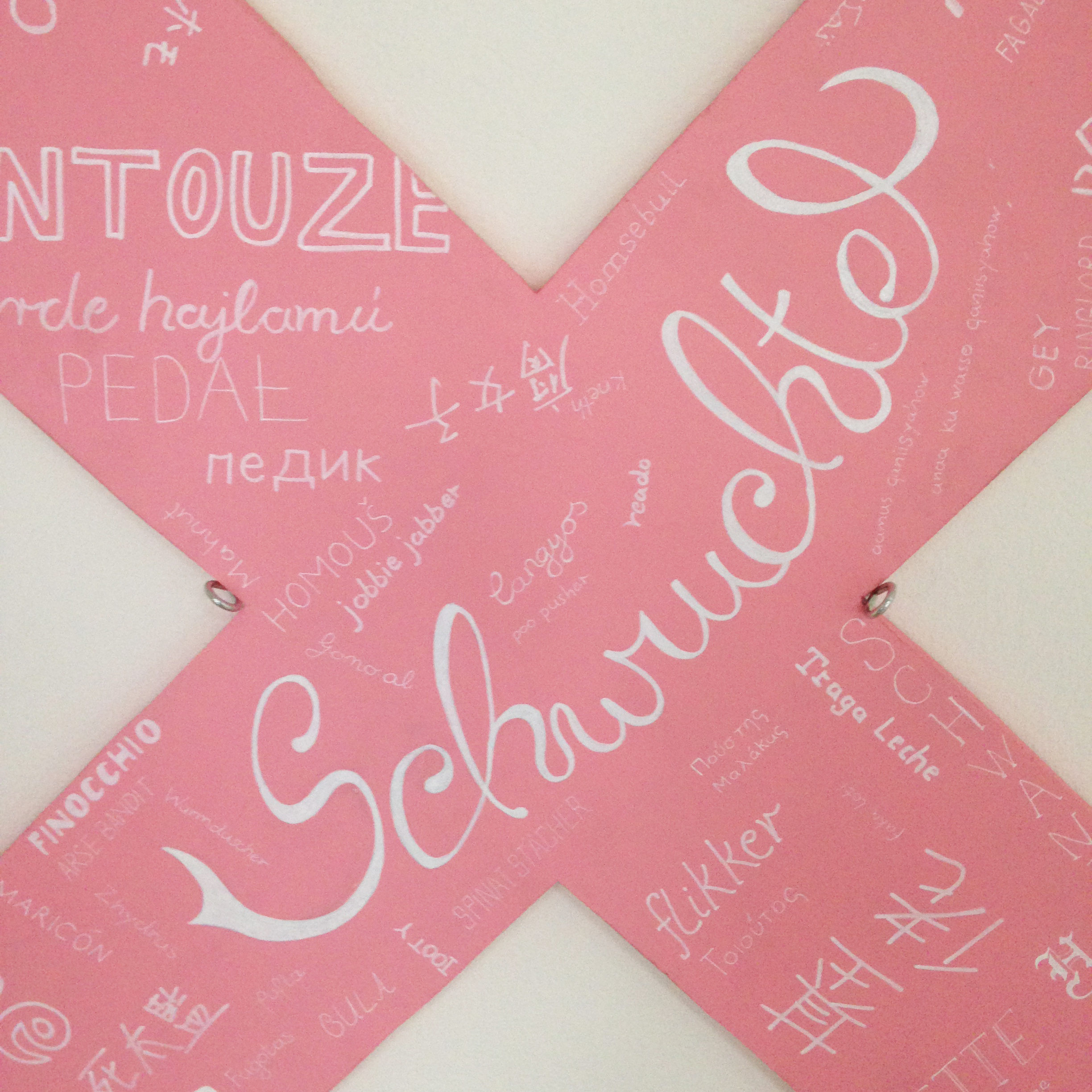Schwuchtel, Exhibition in Prague 2017

“Schwuchtel” is still one of the most used swearword in German schools. A recent study of the Humboldt – University, Berlin (Akzeptanz sexueller Vielfalt an Berliner Schulen – eng: acceptance of sexual diversity at Berlin schools, published 2012) showed that homophobia belongs to the normal day life today.
In 68 countries homosexuality is in conflict with the law and punish people who have homosexual encounters (however it is defined differently in each country). The punishments starts with a fine in Liberia and literally ends with the death penalty in various countries such as for example Jamaica. However in between there are many different punishments.
In some countries for example in China homosexuality is not forbidden, but a taboo topic, which also considers it as an actual illness, so it is written in 40 % of the medicine books approved by the government. Even methods to “heal” this illness are described. Of cause this topic is not openly and widely discussed in China or in several other Asian countries. The so called western countries try to show how open they are, but in fact they still have big issues about this topic and its equality. What else could it be that young and also old people use so many swearwords to insult LGBTIQ people? That young people are insulted because they might be gay? That parents protest against pages about homosexuality in school books? That the rate of suicide of LGBTIQ teenagers are extremely high? That in several countries the marriage is still not open for same sex couples? That homosexual couples are not allowed to adopt children? Why are there so many inequalities? In Germany recently gay people who were imprisoned because of the § 175 a paragraph which forbid sexual encounter between men were finally after many years (most of the men died already) released and the judgment is now considered to be wrong. The men got money from the government for every year they were imprisoned.

But the money they got is nothing comparing to what they lost. Families, friend, jobs, their entire life was suddenly destroyed. So why is there still no equality in our society? The § 175 came into effect in 1872 and was increased by the Nazis. They not only hunted and imprisoned many Gay people but also send them to concentration camps and killed them. After the Second World War the so called “gay paragraph” survived because the politicians’ didn´t see a need in cancelling it. They simply continued to hunt and imprison people. Finally in 1994 the Paragraph was completely cancel. Of cause imprisoned people were set free and the law changed, but for sure there was no acceptance in society at all. Therefor homophobia is strongly connected to the Nazis and the right wings in politics.
Recently in Russia a new law was released, a law which is supposed to protect children from homosexuality. Now in Russia it is not allowed to do what they call it “propaganda”, what simply means same sex couples are not allowed to hold hands, show their feelings in public anymore or simply talk nice about homosexuals? Why does the Russians discriminate LGBTIQ people? The latest news showed that in Chechnya gay men were kidnaped and abducted into Concentration – Camps there they were tortured and some of them died. The Chechnya president Ramzan Kadyrov cemented: “you cannot arrest or repress people who just don’t exist in the republic”… “If there were such people in Chechnya, the law-enforcement organs wouldn’t need to have anything to do with them because their relatives would send them somewhere from which there is no returning” For quite a while neither the media nor the politics reacted on that it even seemed like they tried to ignore the facts. Of cause the political situation is tricky (as usual), but can we compare or even satisfy the situation with human lives?
These where just a few examples to show that in many countries homosexuality is still considered to be wrong and therefor unequal sometimes by law and sometimes by the society.
